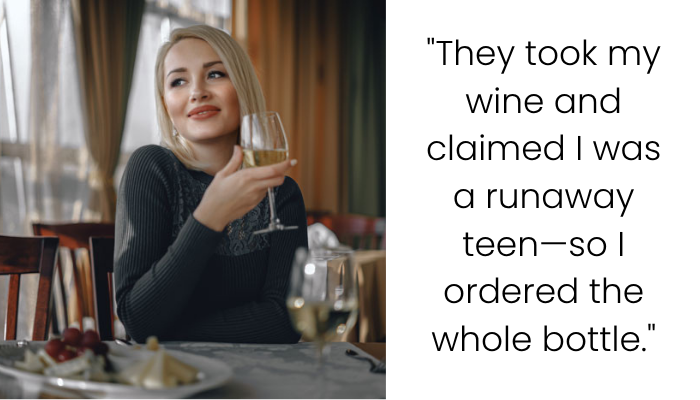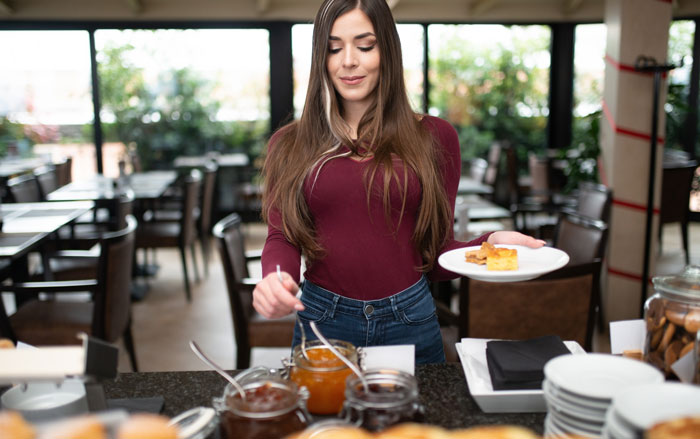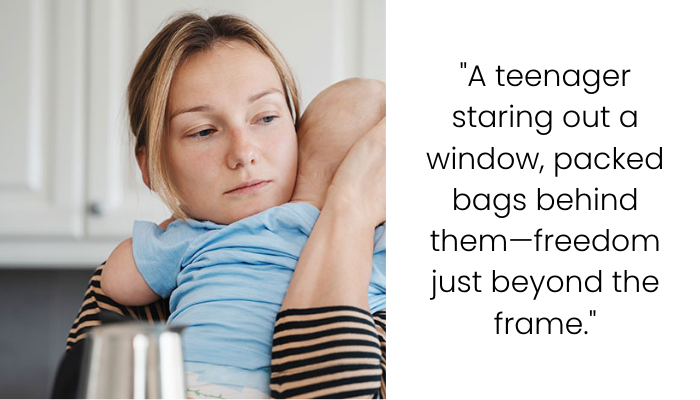AITA for Ordering a Bottle of Wine and Vodka Shots After a Family Tried to Shame Me for Drinking?

In this AITA post, the OP—a solo traveler enjoying an all-inclusive holiday in Tenerife—finds themselves entangled in a dramatic encounter centered around personal freedom and etiquette. The hotel’s communal dining setup places them at a table with a conservative family of five, who immediately take issue with OP’s glass of wine. The mother declares her discomfort with their children being “exposed to women drinking,” prompting OP to politely suggest they request a new table. Things escalate quickly when OP returns from the buffet to find their wine gone and the waiter questioning their age, allegedly informed by the family that OP was an unsupervised minor. Thankfully, the waiter apologizes and brings a fresh glass—just as the family sits down.
Advertisement – Continue Reading Below
Rather than let the passive-aggression slide, OP takes a bold stand by ordering an entire bottle of wine and a couple of vodka shots, which they drink at the table. The conservative family, affronted by this defiance, storms out of the restaurant in outrage. The core question: was this an empowering response to inappropriate policing, or an unnecessary escalation?
Some travelers bring their sunscreen and swimsuits on vacation, others bring their fake moral superiority and judgmental side-eyes

One woman is trying to enjoy her solo vacation with a glass of wine when a judgy family demands she stop drinking, so she orders more in return






Alcohol, Autonomy, and Etiquette in Public Spaces
1. Cultural Sensitivities vs. Personal Rights
Public consumption of alcohol, especially in communal or family settings, often leads to conflict between personal autonomy and social or cultural expectations. The situation described raises the question: should one’s personal habits be adjusted out of respect for others’ sensitivities—even in a leisure setting?
Advertisement – Continue Reading Below

In Western Europe, particularly in tourist-heavy destinations like Tenerife, drinking wine with meals is culturally normative. A solo adult traveler enjoying a glass at dinner in an all-inclusive resort is engaging in a socially acceptable behavior. While some families may have stricter personal values (e.g., religious or cultural prohibitions), these don’t extend as a mandate to others. The expectation that a stranger should modify their legal, non-disruptive behavior to accommodate such views is considered unreasonable in most social etiquette frameworks.
Etiquette expert Emily Post emphasizes that while respect for others is key, “you’re not responsible for someone else’s parenting choices if your behavior is within the bounds of public norms.” In this case, OP’s polite but firm response upheld their right to dine comfortably.
2. Weaponizing Assumptions: Ageism and Control
Accusing OP of being underage and unaccompanied was a strategic and passive-aggressive move. Not only was it a violation of privacy, but it also echoes a problematic trend where people—especially women—are infantilized or judged based on appearance. In legal terms, making a false claim to hotel staff about another guest could be considered harassment or even defamation in certain jurisdictions, particularly if it led to embarrassment or service denial.
Advertisement – Continue Reading Below
In a Reddit-viral case from 2022, a woman was mistaken for a teen by flight attendants and denied wine on a transatlantic flight. The airline later apologized, but the incident highlighted how age-based assumptions, especially toward young-looking women, can result in unfair treatment. OP’s case mirrors this, with a strong gendered undertone to the family’s discomfort with “women drinking.”
3. Is Ordering More Alcohol an Escalation or a Statement?
Ordering the bottle and vodka shots was arguably a form of symbolic resistance. Rather than a petty move, it can be interpreted as reclaiming autonomy and pushing back against shaming tactics. This aligns with what social psychologists term “reactive assertiveness”—an appropriate response when someone’s boundary has been violated but direct confrontation is avoided.
Was it mature? Maybe not by conventional dinner etiquette standards. But it was expressive, non-violent, and clearly highlighted the absurdity of the family’s policing. Some may call it petty; others might say it’s empowering—especially for solo female travelers who often face scrutiny or disrespect in group-dominated spaces.
Advertisement – Continue Reading Below
Moreover, in hospitality etiquette, once a guest has met age and ID checks, their drink choices are not subject to communal judgment. The family had no authority to intervene and overstepped by attempting to manipulate staff. In this light, OP’s response wasn’t just about the wine—it was about setting a clear boundary in the face of unjustified intrusion.

4. The Psychology of Public Shaming
There’s a well-documented psychological phenomenon at play here: moral grandstanding, where individuals assert perceived moral superiority through public displays of disapproval. The family’s comments and actions—publicly denouncing a legal drinker and removing their wine—fit this behavior pattern. According to a study published in Psychological Review (2017), such behavior often backfires, triggering defensiveness and social backlash rather than moral alignment.
OP’s dramatic but humorous response may have flipped the power dynamic—transforming a shaming incident into a memorable act of resistance.
Advertisement – Continue Reading Below
5. The Reddit Consensus on Solo Travel & Boundaries
On subreddits like r/Travel and r/FemaleSoloTravel, stories like this resonate deeply. Solo travelers often discuss being judged for dining alone, being “too young,” or not aligning with family-friendly norms. The advice given almost universally? Set firm boundaries, disengage with disrespectful parties, and enjoy the freedom that solo travel affords.
Your experience is likely to be met with strong support. Not only were you in the right legally and socially, but your confidence in reclaiming your space is a familiar and empowering narrative in travel communities.
Netizens side with the woman, saying she is not a jerk for drinking alcohol as the family is entitled for demanding she stop











